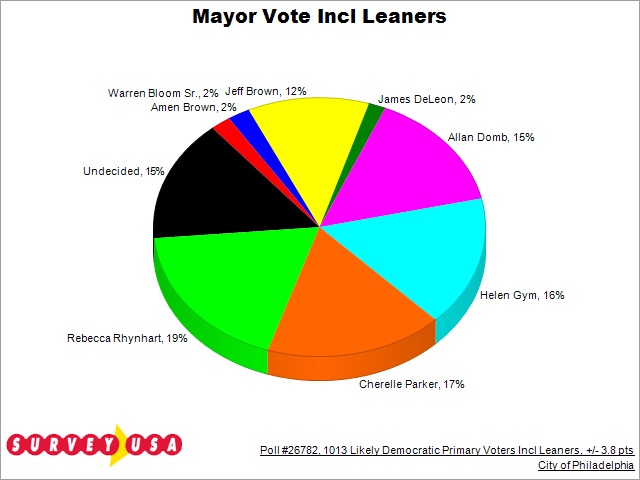According to the first scientific, independent poll of the 2023 mayor’s race, the winner of the election, if it were held today, would be …
Rebecca Rhynhart. Kind of.
The SurveyUSA poll of more than 1,000 potential Democratic voters, organized by the Committee of Seventy, Chamber of Commerce of Greater Philadelphia, Urban Affairs Coalition, FairVote and The Citizen, found that four candidates are basically neck-and-neck-and-neck-and-neck of each other, given the 3.8 percent margin of error. About 20 percent of those polled were undecided.
-
- Former City Controller Rhynhart, with 19 percent of the vote
- Former City Councilperson Cherelle Parker, 17 percent
- Former City Councilperson Helen Gym, 15 percent
- Former City Councilperson Allan Domb, 14 percent
- Businessman Jeff Brown received 11 percent of the vote, and the other three candidates were in single digits

This means it is still anyone’s race come May 16, and that it is unlikely anyone will win with even close to a majority of Philadelphians’ votes.
On the other hand: when the pollsters counted participant’s second, third and fourth choices, in a Ranked Choice Voting (RCV) experiment, one candidate came out ahead with 55 percent of the vote. That candidate?
Also Rebecca Rhynhart.
The next closest candidate, Cherelle Parker, got 45 percent of the vote under the RCV methodology.
“As we saw here, a winner could become mayor of Philadelphia — when a fraction of people vote and there are so many candidates — with 19 percent, or maybe if the undecideds go her way, 30 percent of the vote,” says Deb Otis, Director of Research and Policy for FairVote. “RCV is a way for a nominee to take office with a strong mandate behind them.”
Why this poll matters
It may not. This is, after all, a volatile, competitive and ongoing race and this is just a snapshot of this moment, three weeks out from Election Day. As former Republican mayoral candidate-turned-documentarian Sam Katz wrote in The Citizen last week:
Good polling…captures the mood over the three to four days the poll is in the field. Think about how drastically different the race looks and feels today than it did last week. What will next week bring?
And polling, as we saw most starkly in the 2016 presidential election, can be spectacularly wrong.
But, polling can influence voters who are on the fence, as Committee of Seventy’s Lauren Cristella notes. “There are a lot of people who don’t know who they’re going to vote for and this is one more bit of information that can help them make their choice,” Cristella says. “They may have one or two candidates they really like, and one or two who they know won’t win. This can give information on who might be a consensus candidate.”
So far this election season, the only public polls that have been released have been internal surveys conducted by campaigns. These often feature questions that influenced the results to give candidates something to boast about. (Though the results of our poll are basically consistent with what we’ve been hearing from campaigns.) Jeff Brown and his Super PAC, for instance, released several polls early on to, as Philly 3.0’s Jon Geeting put it a couple weeks ago, “feed the narrative that Brown was the frontrunner and that the race was essentially a two-way contest” between him and Gym.
This week’s poll is the first significant illustration of how Ranked Choice Voting could affect outcomes in a Philadelphia election. RCV works like this: Voters rank their candidates in order of preference. If no candidate wins a majority — as will likely be the case on May 16 — then election officials factor in the second, third (and so on) choices until one emerges as a clear winner, with more than 50 percent of the vote. (When The Citizen first wrote about RCV in 2016, Stephen St.Vincent pointed out that polls showed Donald Trump was disliked by more than half of his party’s primary voters — which means he would have lost an RCV nomination.)
Both the NBA and NFL use RCV in their MVP rankings. “So,” Otis says, “if [Sixer] Joel Embiid finally wins MVP this year, that will be another way RCV will have benefited Philly.”
A version of RCV has been used in Alaska, New York City, Maine, Oakland, Santa Fe, and about 25 other jurisdictions — including Cambridge, Massachusetts, which has held RCV elections since 1945, according to FairVote. In 2021, then-Councilmember Derek Green introduced a resolution to explore what RCV would mean for Philadelphia, but for the city to use RCV even for our municipal races, like in New York, would require a statewide change — something Sen. Anthony Williams has proposed a couple of times, so far to no avail.
Rhynhart’s margin of victory over her opponents soared to 55 percent because she was the second choice for 18 percent of likely Democratic voters; third choice for 16 percent; fourth choice for 9 percent; and fifth choice for 10 percent.
In addition to giving the winner a clear mandate from voters, RCV has other advantages over traditional voting. “It changes campaign incentives,” Otis says. “Right now, candidates know they only need 25 percent of the vote to win. If Philadelphia had RCV, they would have to reach out to more than half the voters to make sure they are in their top choices.” That means getting more Philadelphians engaged in the election — something we definitely need.
Otis says RCV decreases the chance that qualified candidates will drop out of the race to throw their support behind someone else, and has been found to increase the number of women and people of color who are elected because they are less inclined sit out for worry of being a “spoiler” for another candidate in their party. “Those are the people who are often told by the party to sit down and wait,” Otis says. “RCV gives them permission to run without harming their community.”
And, as a recent FairVote survey found in Virginia, RCV leaves voters feeling more favorable to both the winning candidate and the runner-up than traditional polling — a result, Otis says, of candidates needing to appeal to more people in order to make their top two list.
Meanwhile, here’s what we know.
SurveyUSA conducted the poll by phone and text over the last several days, reaching about 1,300 registered voters, 1,000 of whom were Democrats. (Former City Councilmember David Oh is the sole Republican running in the primary.) Of the voters contacted, about 20 percent were undecided, including 25 percent of Black voters and 26 percent of Asian voters.

Rhynhart was the first choice for the highest percentage of White voters, among men, higher-income voters and those in Center City. Parker garnered twice as many Latino votes as any other candidate, led in the Northwest, among conservatives and moderates and among 50 to 64-year-olds. She also led among Black voters — 10 points higher than Brown; this is where she might be able to grow her lead.
Gym, unsurprisingly, was the clear leader among voters who described themselves as “very liberal,” and was just a few points behind Rhynhart among White and upper-income voters. She also had the most votes among those who have already mailed in their ballots. Domb had a small lead among conservatives and moderates, those in the Northeast and those voters with high school diplomas. And Brown did well among conservative, older voters and in early voting.
The survey also asked participants what they thought about Ranked Choice Voting. About half said they had heard of it, including the vast majority of White voters. Almost everyone agreed that the process was easy or very easy.

And about half said they would support bringing RCV to our local elections, including nearly 60 percent of voters 34 and under.

Otis points out that FairVote has not yet done any educational outreach or marketing in Philadelphia around the idea of Ranked Choice Voting, so she’s not surprised more people haven’t heard of it or its benefits. And she offers one additional example that might speak to Philadelphians: Both the NFL and NBA MVP awards use a form of RCV to determine the winner.
“So,” she says, “if [Sixer] Joel Embiid finally wins MVP this year, that will be another way RCV will have benefited Philly.”
![]()
MORE ON THE RACE TO BECOME PHILADELPHIA’S 100TH MAYOR



